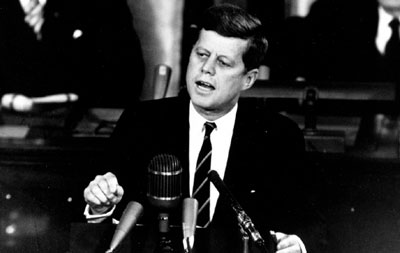They’re no Jack Kennedysby Jeff Brooks
|
| Massachusetts Democrats have, almost to a man, become staunch opponents of manned spaceflight. |
On July 22, 2005, the House of Representatives voted on the NASA Authorization Act, which established the goals of returning to the Moon and eventually sending an expedition to Mars as official American policy. The vote was quite lopsided, with 383 yeas against a mere 15 nays. Amazingly, of the 15 representatives voting against the bill, four were Massachusetts Democrats: Barney Frank, Marty Meehan, John Olver and John Tierney. In other words, the Massachusetts delegation made up over a quarter of the opposition to the bill, even though Massachusetts representatives make up only 2.3% of the House.
In 2006, Congress debated HR 5672, the Departments of Commerce and Justice, Science and Related Agencies Appropriations Act. Representative Frank introduced an amendment to the bill that would have prohibited NASA from allocating money to any activity connected to the human exploration of Mars. This measure was defeated by a vote of 274 to 145, nearly a two-to-one margin. However, nine out of the ten representatives from Massachusetts voted in favor of the Frank amendment. The sole Massachusetts representative who dissented from his delegation colleagues was Congressman James McGovern.
During debates on the same piece of legislation, Congressman Anthony Weiner, a Democrat from New York, offered an amendment that would have transferred $477 million from NASA exploration budget to a community policing program. Needless to say, robbing NASA of nearly half a billion dollars at such a crucial juncture would have shattered the Moon-Mars initiative. Fortunately, the measure went down to defeat by a margin of 236 to 185. Once again, however, the Massachusetts delegation voted for the measure by nine to one, with Congressman McGovern again being the sole Massachusetts vote for a pro-space position.
What might be the cause of the disproportionate opposition to space exploration manifested by the Massachusetts congressional delegation? It seems to stem largely from Congressman Frank, who has made his opposition to manned spaceflight something of a pet issue. While his fellow Massachusetts representatives essentially limit their opposition to their votes on the House floor, Frank has repeatedly spoken out against the human space program in the press.
| If Representative Frank ever decides to make his opposition to manned spaceflight more than a mere pet issue, it could signify real trouble. |
Perhaps, therefore, the Massachusetts delegation has lined up against space exploration more out of solidarity with Congressman Frank than because of any deeply-held convictions. After all, he is held in high regard by his colleagues and, as chairman of the powerful Financial Services Committee, is one of the more influential members of the House. Because it does not cost them much political capital to adopt an anti-space position, while they are in a position to gain favor with Congressman Frank by going along with him, the pluses of voting against space exploration clearly outweigh the minuses.
Thus far, the Massachusetts opposition to manned spaceflight has not inflicted serious damage on the Moon-Mars initiative. But it may present a problem in the future. The margin of victory over the Weiner amendment was uncomfortably close, indicating that congressional support for manned spaceflight may not be very deep. If Representative Frank ever decides to make his opposition to manned spaceflight more than a mere pet issue, it could signify real trouble. The Massachusetts delegation could form the core of an organized bloc in opposition to manned spaceflight beyond Earth orbit. This question will become much more pressing after the first flight of Orion, when our political leadership will no longer be able to delay the decision about whether or not to push forward with the Moon-Mars initiative.
Take note, fellow space advocates. We need to be keeping a wary eye on Massachusetts.
